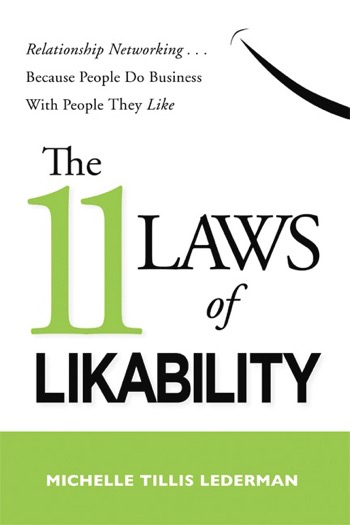 The 11 Laws of Likability, by Michelle Tillis Lederman is another book legislating business something-or-other into a neat little list. It’s a book I picked up to support, or challenge, or validate my efforts to approach the business community and discover my own network. I’m someone who wants to have some idea of the pits I’ll be falling in, and a rough sketch of how to climb out of them. When I shift my focus, I want a reference point for that focus, which often comes in the form of a book or two.
The 11 Laws of Likability, by Michelle Tillis Lederman is another book legislating business something-or-other into a neat little list. It’s a book I picked up to support, or challenge, or validate my efforts to approach the business community and discover my own network. I’m someone who wants to have some idea of the pits I’ll be falling in, and a rough sketch of how to climb out of them. When I shift my focus, I want a reference point for that focus, which often comes in the form of a book or two.
The 11 Laws of Likability is a book partially about what personal qualities will probably cause people to like you, and partially a practical book about business networking. Unfortunately, it’s almost entirely anecdotal, taken from Lederman’s personal experience. That’s not to say it’s not worth reading—I had just hoped it’d paint with broader strokes.
As you would expect, the book is divided into 11 chapters, one chapter for each law, across 3 lettered sections.
Part A: Laws dealing with perspective
Authenticity – You have to genuinely be yourself.
Self-Image – You have to like yourself before others will.
Perception – Other’s perception of you, and your perceptions of others are as good as reality.
Energy – “energy” we put before people is the “energy” we will get back.
Part B: Laws dealing with conversations
Curiosity – Being genuinely curious about someone will help them engage in good conversation.
Listening – Honestly listening is the only way to understand.
Similarity – People like those with whom they have lots in common.
Mood Memory – If you make people feel good, they will feel good when they remember you.
Part C: Laws dealing with continuing a relationship
Familiarity – The more familiar someone is with you, the more comfortable they will feel about you.
Giving – It’s better to give to give than to give to get.
Patience – What goes around comes around, it just takes time.
The 11 Laws of Likability proved to be a little more ideologically driven than the previous book, Networking is Not Working. I ignored my initial expectation was that this book would lean on the manipulative side of things—practical advice about contorting people’s perceptions. In fact, it was much more about the importance of being authentic while finding a more likable expression of self.
Unfortunately, the practical side of the book felt flimsy. A fairly sizable section of text was dedicated to internet lingo. That might be helpful for some, but for me it seemed like it was just taking up space.
This is a book which, I think, uses too authoritative a tone. It’s insightful and anecdotally interesting, but ultimately not packed with a ton of meat. It referenced very little external material, and the first quote of the book was from “Dr.” Phil. So… yeah. It’s really a book about a smart woman’s perspective and I really enjoyed it for that. But, I might have an even higher impression of it if the book itself seemed to know that.
If you’re wondering how to approach the social world of business, this book is an easy read and you will probably find it interesting. It’s also a light read, with each chapter coming in for me at less than 15 minutes. It’s not a waste of time.

Recent Discussion